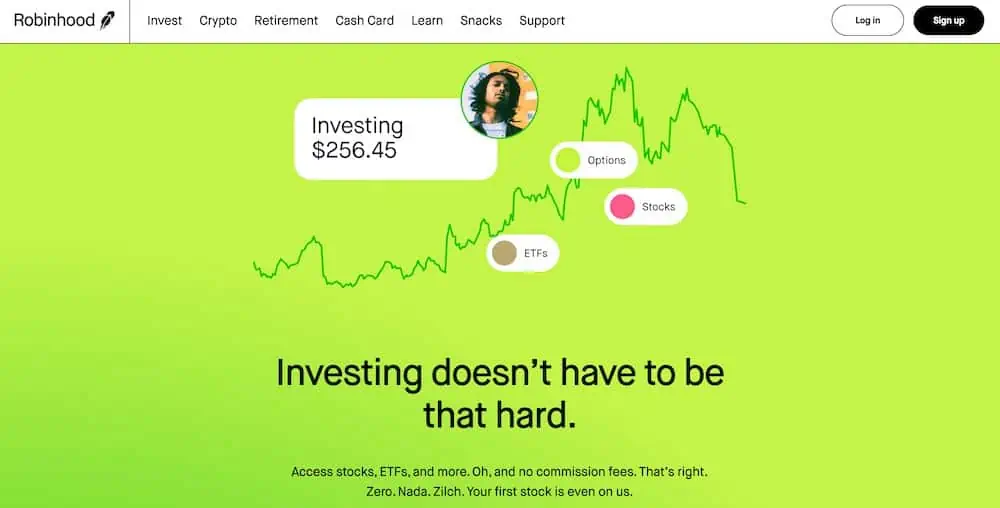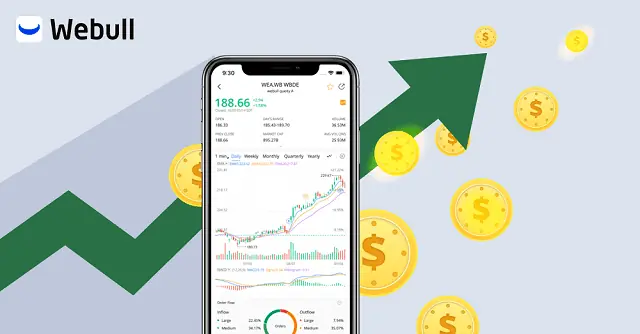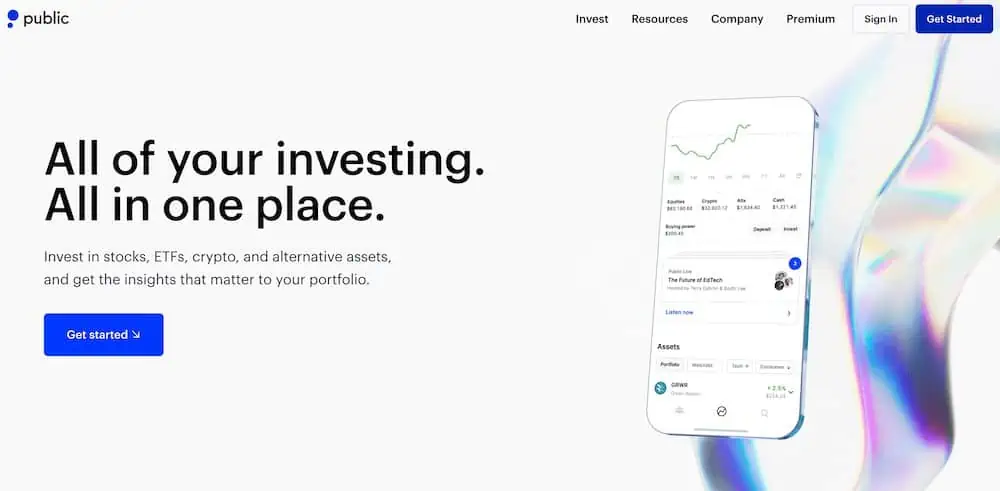Best Stock Trading Apps for Beginners—Top Picks
|
4.5
|
4.5
|
4.5
|
|
Get free stock worth $5 to $200
|
Free. Reduced commissions with monthly account: $99/mo. Greatly reduced commissions with lifetime account: $1,499. Data fees separate.*
|
Commission-free equity trading.
|
Best Stock Trading Platforms for Beginners
| App | Apple App Store Rating + Best For | Fees | Promotions |
|---|---|---|---|
 Robinhood Robinhood | ☆ 4.2 / 5 Beginners | Commission-free trades | Free stock with signup and linked bank account ($5-$200 value) |
 NinjaTrader NinjaTrader | ☆ 4.2 / 5 Futures and forex traders, beginners looking for free sim trading | Free, $99/mo. (reduced commissions), or $1,499 one-time payment (greatly reduced commissions); data fees may apply | None |
 E*Trade E*Trade | ☆ 4.6 / 5 Options traders | Commission-free trades | Free account bonus commensurate with contributed funds |
 Moomoo Moomoo | ☆ 4.6 / 5 Advanced traders looking for low margin rates | Commission-free trades | 7 free stocks (worth $35 in total) |
 Webull Webull | ☆ 4.7 / 5 Intermediate traders | Commission-free trades | 20 free stocks with $500 deposit, valued between $60 - $90,000 |
 Public.com Public.com | ☆ 4.7 / 5 Social theme-based investing interests | Commission-free trades | None |
 Schwab Schwab | ☆ 4.8 / 5 General investors, active or passive | Commission-free trades | Get $101 to invest |
 Vanguard Vanguard | ☆ 4.7 / 5 Vanguard fund investors | Commission-free trades | None |
 Betterment Betterment | ☆ 4.7 / 5 Building a globally-diversified portfolio | $4/mo., but changes to 0.25% annual AUM fee if you set up recurring monthly deposits totaling $250, or reach a balance of at least $20,000 across all Betterment accounts. Premium: 0.65% annual AUM fee | None |
 Acorns Acorns | ☆ 4.7 / 5 Automated investing | $3/month - $12/month | $20 bonus when you set up recurring investments and make your first successful recurring investment |
| *Apple App Store Rating as of May 31, 2024 | |||
1. Robinhood (Best Stock Trading App for Beginners)
- Available: Sign up here
- Best for: Beginner traders
- Platform: Web, mobile app (Apple iOS, Android)
Robinhood is a pioneer of commission-free trading, jumping into the investing public’s consciousness in 2013 when they rolled out commission-free trading. They remain a standout option for cost-minded investors thanks to their continued $0 commissions on stocks, ETFs, and options, as well as for its fractional trading, which allows people to invest with as little as $1.
More importantly, though, Robinhood has evolved from a bare-bones app appealing to mostly beginner investors to a fuller-featured account suitable for a wider range of experience levels.
For instance, Robinhood now offers individual retirement accounts (IRAs) and Roth IRAs via Robinhood Retirement. Functionally, it comes up short compared to many other IRA providers because of its investment options. It offers just stocks and ETFs; like with its brokerage account, mutual funds aren’t available.
However, Robinhood Retirement still stands out from the pack because it’s the only IRA provider that offers matching funds. If you open up an IRA with Robinhood Retirement, Robinhood will match 1% of any IRA transfers, 401(k) rollovers, and annual contributions to your account—and 3% if you pay for the Robinhood Gold service ($5 per month)—typically almost immediately after you make your contribution. Better still: Any matches made on annual contributions don’t count toward your contribution limit.
(Friendly message from your WealthUp tax expert: The reason the IRA Match doesn’t count toward your annual IRA contribution limit is because Robinhood treats it as interest income in your IRA.)
Robinhood Gold, which I mentioned above, is a monthly subscription service that offers several more features mostly geared toward advanced traders. Benefits include Level II market data provided by Nasdaq, a lower charged rate on margin investing than regular accounts, higher interest on uninvested brokerage cash via the cash sweep program, and bigger Instant Deposits.
If you want to keep your banking and investing close together, you can also add a Robinhood spending account. This FDIC-insured account includes a Robinhood Cash Card issued by Sutton Bank—however, if you don’t want this physical debit card, you do have the option of having a virtual debit card only. The Cash Card is compatible with Apple Pay, Google Pay, and Samsung Pay, and also provides you with access to fee-free withdrawals from more than 90,000 ATMs. The card allows you to round-up purchases and invest the money into your brokerage or crypto account.
Sign up for a Robinhood brokerage account or Robinhood retirement account today.
- Robinhood is a pioneer in the investing app world, offering commission-free trades on stocks, ETFs, options, and cryptocurrency, as well as one of the deepest libraries of investing educational content.
- Investing for retirement? Robinhood will match 1% of any IRA transfers or 401(k) rollovers, as well as any annual contributions*, made to your Robinhood Retirement account—and you can get a 3% match on any new contributions if you subscribe to Robinhood Gold.
- Want more advanced trading tools? Download Robinhoold Legend—a desktop trading platform with real-time data, customizable layouts, deeper asset analysis, and more—for free.
- Robinhood's robo-advisory service, Robinhood Strategies, will build you a custom portfolio of stock and bond ETFs (and individual stocks for accounts with at least $500), for a low 0.25% in AUM, which is capped at $250 annually for Robinhood Gold members.
- Robinhood Gold also includes Level II market data provided by Nasdaq, higher interest rates on uninvested brokerage cash, lower margin trading rates, bigger Instant Deposits, and access to the Robinhood Gold Card (a 3% cash-back Visa credit card).
- Special offer: Sign up for Robinhood, link a bank account, and fund your account with at least $10, and receive a randomly selected cash amount between $5 and $200 to put toward certain fractional shares.
- Very good selection of available investments in brokerage accounts
- 1% match on rollovers, IRA transfers, and new contributions to IRAs and Roth IRAs (3% new-contribution match with Robinhood Gold)
- Automated recommended portfolios
- Intuitive interface
- Robo-advisory service (Robinhood Strategies)
- Extensive educational library
- No mutual funds in brokerage or IRAs
- Match doesn't apply to Robinhood Strategies accounts
2. NinjaTrader (Best for Free Paper Trading for Beginners)
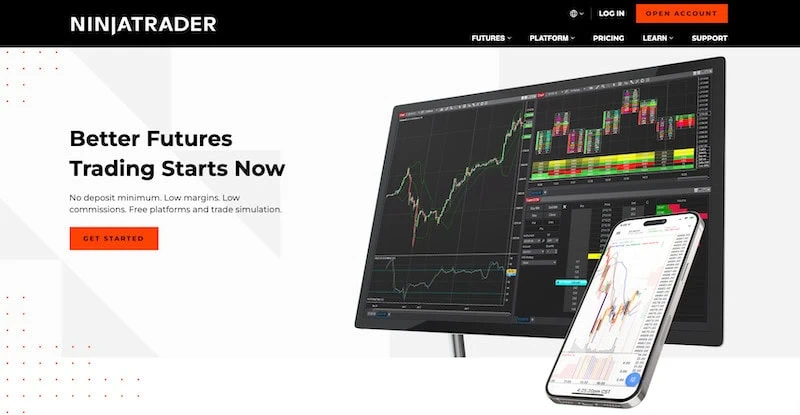
- Available: Sign up here
- Best for: Active traders specializing in day trading futures and forex (and other assets through third party brokers)
- Platforms: Desktop app (Windows), web, and mobile app (iOS and Android)
NinjaTrader is one of the oldest and best known trading platforms on the market.
Specializing in technical analysis tools, real-time analysis, and a clean, fully customizable charting experience, NinjaTrader allows you to employ a fully automated trading strategy through its own brokerage service for futures, options on futures, and forex trading. And while that might seem like a limited set of assets (especially for being mentioned as a stock trading app and platform), NinjaTrader’s other core strengths are its ability to integrate with other brokers like IBKR, Schwab (TDAmeritrade), and others for an add-on fee and its NinjaTrader Ecosystem.
This community of vendors and plugins enrich the NinjaTrader experience through offering education-rich content for free and, among other things, allows you to attach NinjaTrader to several supporting brokerages to give traders access to other markets, including options on futures, contracts-for-differences (CFDs), and equities.
NinjaTrader’s platform offers advanced charting with more than 100 technical indicators, advanced order types, automated trading, order flow analysis, streaming historical market replay, the SuperDOM (depth of market) tool, and more. The NinjaTrader desktop app is the most customizable of the platform’s versions, offering access to “thousands of trading apps and add-ons,” you can still enjoy most of NinjaTrader’s functions via its web and mobile apps.
Unfamiliar with futures trading? Anyone with an account can use NinjaTrader’s free futures trading simulator, which includes a backtesting engine that lets you use historical market data to simulate automated trading strategies and see how they would have performed.
You can download and use NinjaTrader’s platform for free, but you can reduce your commissions by subscribing to a monthly or lifetime account. Additional data does carry additional costs, however. For instance, for CME Level I top of book data (CME, CBOT, NYMEX, and COMEX), it’s $12 per month and Level II costs $41 per month for non-professional users. Professional users pay $135 per month per exchange. ICE Market data also costs $140 per month per exchange for all users.
NinjaTrader’s robust community and suite of tools have established it as a leading charting software—be it for stocks, futures, forex, or other assets. The burgeoning educational guides, video library and free ongoing webinars provide ample access to the understanding traders need to hone their craft. Plus, the platform offers an easy (and free) way to learn what the platform can offer through its SIM trading environment. Consider signing up for a NinjaTrader account and taking the service for a test-drive.
- NinjaTrader is a brokerage account offering access to futures and forex directly, and several other asset classes through integration with third-party brokers.
- The robust charting tools, technical analysis capabilities, and real-time full depth of market data empower active traders to make informed decisions.
- The NinjaTrader Ecosystem offers access to thousands of vendors and plugins and includes a comprehensive educational offering for traders to improve their understanding and execution of trades.
- NinjaTrader offers a free SIM trading environment designed to employ what you've learned from their ecosystem's educational content without risking your own money.
- If you open and fund a NinjaTrader account, you'll receive up to $250 in commission rates for trades placed within 30 days of your funding date.**
- Excellent charting and technical analysis tools
- Partial and full strategy automation
- NinjaTrader Ecosystem offers apps and add-ons
- Free SIM trading environment suitable for beginners
- Robust educational guides, videos and webinars
- Trading equities requires using a supporting broker
3. E*Trade (Best for Options Traders)
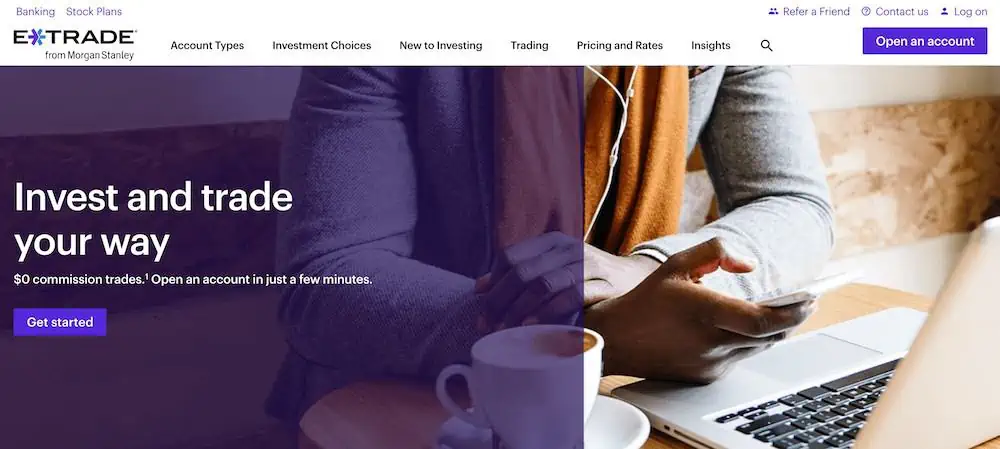
- Available: Click “Open Account” below
- Best for: Intermediate investors
- Platforms: Web, mobile app (Apple iOS, Android)
E*Trade has long been seen as a leading stock trading app for retail investors. It allows you to invest in a wide array of assets, and it provides educational resources that will help you with investment research, portfolio analysis, and building a diversified set of holdings.
E*Trade, like most of the best stock investing apps, offers zero-commission stock, ETF, and options trading (though options still incur a 50- to 65-cent contract fee). It also has a leg up on some platforms by offering $0 commissions on mutual fund, Treasury, and new-issue bond trading. Investors also have access to futures, micro futures, and futures options, among other investment types.
If you use E*Trade, you’ll do so via one of two platforms—both of which are free, and both of which have web and mobile versions:
Power E*Trade
Power E*Trade is a trading platform designated for more intermediate-to-advanced traders. Features include:
- Advanced charting that includes intraday and historical options; more than 100 studies; over 100 drawing tools; and the ability to automatically identify technical patterns
- Snapshot Analysis, which lays out risk-reward probabilities in your options trading
- Powerful stock and trade scanner; use preset filters or customize as you wish
- Paper trading to test out strategies without putting your money at risk
- Price ladder
- Ability to design exit strategies
Like with the Power E*Trade web platform, the Power E*Trade app is a more powerful version of its basic counterpart. This app allows you to use preset scans, work with interactive charts, place complex options trades, and more.
E*Trade
The “basic” E*Trade web platform might be more suitable for beginning-to-intermediate traders and investors, but in our opinion, that doesn’t mean it’s short on features.
E*Trade’s main web platform includes everything you need to keep up to date on your portfolio, including real-time quotes, charts, market commentary, and stock news. The latter includes free access to Bloomberg TV, Thomson Reuters, and TipRanks research. Meanwhile, you’ll have ample research tools at your disposal, including stock, mutual fund, bond, and ETF screeners; trade optimizers; backtesters; and more.
Other considerations
E*Trade also touts its educational resources, which includes articles, videos, and classes, as well as monthly webinars and live events. While we wish the educational content were a bit easier to sort through, it’s a high-quality collection that will benefit investors who want to learn along the way.
Want to keep it simple? E*Trade also offers an automated investing platform, called Core Portfolios, where you can let E*Trade manage as little as $500. Answer a few questions about yourself, your goals, and your risk tolerance, then E*Trade will provide you with a suggested portfolio that you can either accept or personalize more before putting it to work. From there, E*Trade will automatically invest funds for you and manage the portfolio. Fees are 0.30% annually, or $30 on every $10,000 invested.
Visit E*Trade and sign up by clicking “Open Account” below.
- E*Trade is one of the best online and mobile trading platforms among discount brokers, offering a full range of investments (including professionally managed accounts). It allows you to invest in stocks, ETFs, mutual funds, options, bonds, futures, micro futures, and futures options.
- $0 commission trading for online U.S.-listed stocks, ETFs, options, mutual funds, Treasuries, and new-issue bonds. (Options have a 65¢ contract fee, or 50¢ at certain volume thresholds.)
- Opening an account is easy and only takes a couple of minutes.
- Bonus: Get between $50 and $10,000* when you click the box below, then open and fund a new investment account using promo code "OFFER25."
- Excellent selection of available investments
- Commission-free mutual funds and Treasuries
- Automated portfolio builders and prebuilt mutual fund and ETF portfolios
- Separate apps for power users and casual users
- Limited availability of fractional shares (only in DRIP plans or robo-created portfolio)
- No direct cryptocurrency trading
4. Moomoo (Stock Trading App With Low Margin Rates)
- Available: Sign up here
- Best for: Advanced traders
- Platforms: Desktop app (Windows, Mac), web, mobile app (Apple iOS, Android)
Moomoo is a commission-free trading platform for stocks, ETFs, and options. While Moomoo is best for advanced traders, offering powerful tools to empower your trading insights and strategies, it takes a different approach from other similarly targeted platforms, favoring simple interfaces and high ease of use, thus why we believe it merits a mention on this beginner stock trading app article. The desktop platform is highly customizable, while the mobile app is straightforward, allowing you to search for stocks and trade with minimal hassle.
Still, Moomoo has more than enough under the hood for advanced traders to get the job done. Its charting system, for instance, includes 62 technical analysis indicators and 22 drawing tools. You can set up alerts based on changes in price, bids, turnover ratio, and more. Free Level 2 market data helps you get a greater understanding of a stock’s value, determine how liquid a stock truly really is, and better time your trades. You can even enjoy 24/7 financial news handpicked by Moomoo’s editorial team. The trading platform provides these features to empower investors to make better investing decisions.
One Moomoo feature worth noting is its mobile charting, which allows traders to take advantage of more than 60 investing indicators and 38 drawing tools. And any drawings or annotations you make are saved and synced with your profile so you can view them from either the app or your desktop.
While Moomoo isn’t as suitable to beginner traders as some of the other apps on this list, the trading platform does include some useful educational tools. For instance, paper trading functionality with real-time data simulates the investment experience without committing any of your real money. (This feature is also helpful to advanced traders, allowing them to test out strategies and hone their skills.)
Moomoo also boasts relatively low rates for trading on margin. The annualized interest rate on financing, as of this writing, is 6.8%—one of the most competitive rates among its peers.
The app pays you for giving it a spin by offering free stocks when you make a qualifying deposit after signing up. Specifically, you can get free stocks if you sign up for a Moomoo account and make a qualifying deposit.
If you want a professional-grade system for research and trading, but with a simpler user experience, Moomoo is among the best trading platforms to consider.
For Moomoo disclaimer, please see the fine print at the bottom of this article.
- Moomoo is an all-in-one investment app geared toward stock, ETF, and options traders who want to work with real-time market data at the ready.
- The service offers free Level 2 market data, offering more insight into the trading activity below the NBBO surface shown on many financial data sites.
- Use the service's powerful stock charting software capabilities to find trading opportunities.
- Get a great return on uninvested cash: Moomoo currently offers a 4.1% APY from its cash sweep program, though current promo offers 8.1% for a limited time.
- Special offer: New users get up to $1,000 in free NVDA stock when they sign up using our link and make a qualifying deposit,* as well as a three-month APY boost (to a total 8.1% APY on uninvested cash).
- Additional special offer for transfers: New customers who transfer assets into a Moomoo account can also receive a 3% match on their transfer up to $20,000 (for a reward cap of $600). New users who transfer in $50,000 or more and maintain for three days will also receive two suite tickets to a New York Mets game.
- Free Level 2 market data
- Free powerful stock charting software
- Free paper trading
- Low margin rates
- Fewer features than peers
- No robo-advisor functionality
5. Webull (Best Stock Trading App for Intermediate Traders)
- Available: Sign up here
- Best for: Self-directed investors and intermediate traders
- Platforms: Desktop app (Windows, Mac, Linux), web, mobile app (Apple iOS, Android)
Webull first hit the investing world in 2018 and made a splash by offering free stock trading, as well as commission-free trading of exchange-traded funds (ETFs) and options. And since then, it has become one of the best stock trading apps for intermediate traders, though many of its features are helpful to beginner investors as well.
For one, Webull remains friendly to wallet-conscious traders today. It costs nothing to open a Webull account. Stocks, ETFs, and options still trade commission-free. Many options have $0 contract fees. And Webull has no deposit minimums. On top of that, it offers fractional shares, which allows investors to start buying for as little as $1.
Webull also is available across just about every platform, allowing you to research, trade, and track your stocks on your smartphone, tablet, or desktop.
Why choose Webull to trade stocks?
Webull provides traders with a number of useful features and tools, including:
- Customizable screeners for both stocks and ETFs
- Preset lists–including Top Gainers, Top Losers, Most Active, and Best-Performing Industries—traders can use to identify opportunities
- Free real-time stock quotes
- 12 charting tools and more than 50 technical indicators
- Real-time stock alerts you can set to notify you of events such as significant price action or certain technical conditions
- Numerous order types—simple orders such as limit and market orders, sure, but also group orders such as bracket, OTO, and OCO orders
- Quant ratings that help you to evaluate stocks through numerous lenses, such as growth, value, income, quality, and momentum
These tools make Webull one of the best stock research and analysis apps for traders.
Also noteworthy: Webull provides one month of free Level 2 Quotes powered by Nasdaq TotalView. Per Webull: “It provides the best 50 levels of bids and asks for all NASDAQ-, NYSE- and regional-listed stocks on NASDAQ Market Center. It includes the prices and quantities of displayed quotes and orders, allowing investors to better determine the availability or demand for a stock at a certain price.” Experienced day traders can use these quotes to try to determine where the stock market is headed in the very short term. (Note: Level 2 Quotes cost $2.99 per month after the free trial.)
And traders can even get paid for stocks they’re sitting on. Webull’s Stock Lending Income Program allows you to receive interest, accrued daily and paid monthly, for allowing Webull to borrow certain stocks. The interest rate varies widely depending on demand for a particular stock.
Webull also has a couple other fun (and still useful!) features. For instance, you can set up voice commands that will allow you to simply speak to buy, sell, or look up information on a ticker. There’s also “Big Button Mode,” which, as you’d guess by the name, populates giant buttons on your screen that allow you to quickly make trades with just a push.
We’ll point out that while Webull allows for many types of commission-free trades, other costs will still apply to a few transactions. For instance, a 55-cent contract fee applies to certain options trades. Webull doesn’t directly charge fees for trading cryptocurrencies, but it does build a 1-percentage-point markup into the price of cryptocurrency when you buy or sell crypto. And Webull’s margin rates, which are variable depending on the debit balance, are currently roughly middle-of-the-road.
You should also know that you can’t buy mutual funds on Webull, though that’s more of a concern for long-term investors and less so for traders.
Regardless, Webull remains one of the best, and most cost-friendly, trading platforms you can come across. And on top of all the free features mentioned above, Webull also runs frequent promotions that allow investors to collect free stocks.
Consider signing up with Webull today.
- Webull is a low-cost trading and investing app that allows you to invest in stocks, ETFs, options, futures, commodities, and crypto, and even participate in initial public offerings (IPOs).
- No-commission stock, ETF, and option trades (and many options have $0 contract fees).
- Trading features such as charting tools, technical indicators, customizable screeners, real-time stock alerts, and group orders.
- Let Webull manage your money for you with Webull Smart Advisor, which combines Webull's in-house investment expertise and artificial intelligence to build, manage, and rebalance an ETF portfolio for you.
- Sign up for Webull Cash Management to earn up to a 4.1% APY on uninvested cash.
- New users get one free month of Nasdaq TotalView's Level 2 Quotes service. (That subscription costs $2.99/mo. thereafter.)
- Subscribe to Webull Premium and receive a premium APY on uninvested cash in individual and joint cash accounts, premium margin rates, a 3% match when you transfer or roll over your IRA, and an extra 3.5% match on qualifying IRA contributions.
- Special offer: Make an initial deposit of at least $2,000 and receive 1.) a $100 cash bonus, 2.) a 2% match of your deposit (up to a maximum bonus of $20,000), 3.) a 30-day voucher for Webull Premium, 4.) a 30-day 4.0% APY booster on uninvested cash (for a total of 8.1%).**
- Good selection of available investments
- Fractional shares
- Powerful technical analysis tools
- Offers robo-advisory services
- Accessible to beginning and intermediate users
- Voice commands
- Offers highly competitive APY through Webull Cash Management
- Does not support mutual funds
6. Public.com (Best Stock App With Alternative Assets)
- Available: Sign up here
- Best for: New investors with limited capital
- Platforms: Web, mobile app (Apple iOS, Android)
Public.com is a commission-free investing app, geared toward Millennials and Gen-Zers, that as of late has built up the types of assets available to its users. On Public, users can invest in not just stocks and ETFs, but also more than 25 different cryptocurrencies—and more recently, alternative assets from art to sneakers.
That last point is worth a callout. Alternative assets are a relative rarity among investing apps. They can be difficult to research (and thus difficult to properly invest in), but they can provide uncorrelated returns compared to the stock and bond markets, so many savvy investors like to diversify into these assets.
But while the number of tradable assets on Public.com is growing, it’s still somewhat limited: It doesn’t offer mutual funds, options, bonds, or futures. New users are also limited to individual brokerage accounts.
The “Public” part of the name nods at the platform’s social aspect. For one, you can make your portfolio holdings open to other users, and conversely, you can look through other Public users’ portfolios. Investors can also connect with corporate founders and CEOs through live “Town Hall” meetings.
Public also acts as a micro-investing app, allowing you to invest in fractional shares with as little as $1.
Users can also upgrade their experience with the $10/month Public Premium subscription.
Public Premium offers some features that are included in some discount brokers’ services, but other features help to justify the cost. For instance, Premium offers extended-hours trading (8 to 9:30 a.m., and 4 to 8 p.m. EST) and stock price alerts—several competitors, such as TradeStation and E*Trade, offer these services at no charge. However, Premium also provides:
- Advanced data on companies—Public.com’s examples include Tesla quarterly deliveries by model or Apple’s annual sales by continent
- Institutional-grade research provided by Morningstar
- Members-only analysis about events including major economic report releases, earnings announcements, and more
- Exclusive audio programming by Public.com’s expert analysts
What makes Public.com different?
Unlike other free stock trading apps found on this list, Public.com does not monetize its trading activity through receiving payment for order flow (PFOF). PFOF, in brief, is money that a market maker pays a brokerage firm for routing trades through that market maker.
Some investors have called out this practice as harmful to everyday investors, providing them with worse trade-execution prices than they would otherwise get—and this call grew louder amid the GameStop market mania in early 2021. In the wake of this event, Public.com announced a change in its revenue model, breaking with how many free stock apps generate income. Instead, it makes money off interest on cash balances, securities lending, and even tipping—users can choose to (but are not required to) tip Public when submitting trade orders. Public also will make money off its Premium subscription product.
By doing this, Public.com believes it’s better aligning its financial incentives with the best interests of its customers.
If you’re interested, you can sign up today and receive a free “slice of stock.” Or, if you’re transferring funds from a different brokerage account, Public.com will provide you with a cash bonus. While Public says it will pay out up to $10,000, that’s on an account transfer of $5 million plus. More common payouts include $150 for transfers of between $5,000 and $24,999, and $250 for transfers of $25,000-$99,999. (And at the very least, if you transfer at least $500, Public will reimburse you up to $100 per transfer for any fees charged by your original brokerage firm.)
For Public.com disclaimer, please see the fine print at the bottom of this article.
- Public.com offers zero-commission trading on thousands of stocks and ETFs, available as fractional shares. The app also allows you to invest in cryptocurrency, and it's one of the rare brokerages that allows its users to buy alternative assets.
- Lock in a 6% yield with Public.com's Bond Account, which allows you to invest in a diversified portfolio of investment-grade and high-yield bonds.
- Use a social feed where members can share why they believe in certain companies (or don't) and can post comments on others' trades.
- Invest in curated lists of stocks and ETFs for people to aggregate investments by interest area or values.
- Subscribe to Public Premium for features such as advanced company-level data, Morningstar insights, and exclusive audio content from Public.com's expert analysts.
- Special offer 1: Receive between $150 and $10,000 when you transfer your investment portfolio to Public.**
- Special offer 2: Receive an uncapped 1% match on transfers into a Public IRA.
- Fractional shares
- Allows you to trade alternative assets
- No payment for order flow (PFOF)
- Creative social investing features
- Doesn't support mutual funds
- Limited investment research and other tools
7. Schwab (Best Traditional Broker for Beginner Traders)
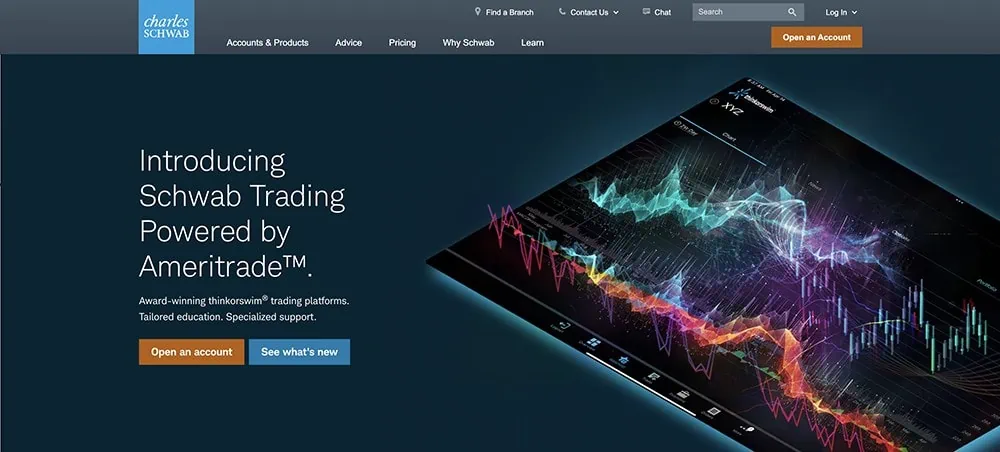
- Available: Sign up here
- Best for: Intermediate investors
- Platforms: Web, mobile app (Apple iOS, Android)
Investors looking for maximum flexibility and low (or no) trading costs should explore a brokerage or retirement account with Schwab.
Schwab offers commission-free stocks, ETFs, thousands of mutual funds (from Schwab Mutual Fund OneSource), and even Treasury trades. Additional investment selections include corporate bonds, options, money market funds, futures, E-mini futures, and foreign exchange (forex), and you can even participate in some initial public offerings (IPOs) through the Schwab platform.
Want to learn more? Check out the review here, and from there, click the “Visit Site” button to visit Schwab and sign up.
- Charles Schwab is one of the best online and mobile trading platforms among discount brokers, offering a full range of investments (including professionally managed accounts). It allows you to invest in stocks, ETFs, mutual funds, options, bonds, futures, micro futures, and futures options.
- $0 commission trading for online U.S.-listed stocks, ETFs, options, mutual funds, and Treasuries. (Options do have a 65¢ contract fee.)
- More experienced traders can find plenty of horsepower in the Thinkorswim platform, which provides advanced charting, screening, complex options trades, access to a trading community, and more.
- Learn with Schwab, too. Schwab offers a wide variety of educational resources and stock news. The accounts offer regular market commentary, tax planning and retirement advice, stock and fund screeners, Schwab courses ranging from “Income Investing” to “Directional Options: Single Options and Spreads," and even access to Onward—Schwab’s quarterly financial magazine.
- Opening a Schwab account is easy and only takes a couple of minutes.
- Excellent selection of available investments
- Commission-free mutual funds and Treasuries
- Schwab Intelligent Portfolios (robo-advisory)
- Thinkorswim platform (absorbed from TD)
- Fractional shares
- No direct cryptocurrency trading
8. Vanguard (Best for Vanguard Fund Investors)
- Available: Sign up here
- Best for: Basic trading options with cheap mutual fund investing
- Platforms: Web, mobile app (Apple iOS, Android)
Vanguard has long been regarded as the low-cost index fund investing service provider. In fact, in 1975, John Bogle launched the first U.S.-listed index fund available to retail investors. Now, Vanguard offers numerous dirt-cheap index products in both its mutual fund and exchange-traded fund lineups.
But Vanguard also offers low-cost investing, and no account minimums, through its brokerage and other accounts. That means commission-free trading not just on Vanguard products like VTI or VTSAX, but also on stocks, all other ETFs, and all no-transaction-fee mutual funds. But investors and traders still shoulder some costs. Unless you have more than $1 million in your account, transaction-fee mutual funds cost $20 per trade. And if you have a higher risk tolerance, you can trade options on Vanguard—but while commission-free, you’ll still incur a $1 contract fee on options trades.
Vanguard’s web and mobile versions are very much geared toward beginning investors, though the latter is better-designed. The web version can be downright clunky at times, and it can be difficult to access some of the features. I used to use the app to manage my work’s 401(k) plan, and I’ll admit to its bloat and lack of clarity on calculating investment returns on a percentage basis. The mobile apps run more smoothly, and I like the secure two-step login. But certain features, such as price alerts, aren’t available on mobile.
My main beef with Vanguard’s apps is that they make it difficult to measure the performance of individual holdings. All that said, Vanguard might have made this by design, incentivizing you to check your funds less often and thus living by their buy-and-hold ethos.
Still, if you’re a beginner who’s not sure if you’ll be more into trading, or more into long-term investing, a Vanguard account is a good place to start.
- Vanguard's low-cost mission continues through its commission-free brokerage and other investment accounts. Invest in stocks, ETFs, and Treasuries with zero commissions.
- Pay $0 to trade Vanguard mutual funds and no-transaction-fee mutual funds.
- Want to trade options? You can do that on Vanguard, too.
- Vanguard's mobile app is simple and easy to understand.
- Good selection of available investments
- Commission-free Treasuries
- Some commission-free mutual funds
- Can purchase fractional shares of mutual funds
- Can optimize your portfolio with Vanguard Portfolio Watch
- Limited investing and research tools
- Somewhat clunky web interface
- High options contract fees
- Limited features on mobile app
- No fractional shares of stocks or ETFs unless reinvesting through a DRIP plan
9. Betterment (Best Investment App for Tax-Loss Harvesting + Automated Investing)
- Available: Click the “Get Started” button below
- Best for: Investors who prioritize simplicity, tax-loss harvesting
- Platforms: Web, mobile app (Apple iOS, Android)
Betterment is a robo-advisor platform that allows you to invest in pre-built portfolios—with different themes and goals—in taxable accounts as well as individual retirement plans.
Betterment’s primary offering is ETF-only portfolios that provide varying types of exposure depending on your risks and interest. For instance, Core is a stock-and-bond portfolio that keeps you invested in most domestic and international securities, in the ratio of stocks to bonds that’s most appropriate for you. Social Impact buys stocks and bonds of companies with “a demonstrated focus on supporting social equity and minority empowerment.”
There are no self-directed options, however. The portfolios buy fractional shares of ETF index funds tracking benchmarks like the S&P 500 to keep you invested in stocks and bonds. But the service does not allow you to invest in individual stocks or bonds. The app has added crypto portfolios holding digital currencies such as Bitcoin and Ethereum, but again, you can’t buy them individually—only through pre-built portfolios held in separate crypto accounts.
That makes Betterment one of the best investment apps for beginners—especially those who don’t want to be particularly active in selecting what they hold.
One interesting perk that stands out: Betterment’s tax-loss harvesting feature.
If you invest in a taxable account, and you sell an investment for a gain, you’ll owe taxes on those gains. (What you owe differs depending on whether you’ve held that investment for more than a year.) However, if you sell an investment for a loss, you can use that to offset your capital gains, and thus the taxes you’d pay on them, or if your loss is more than your gains (or you don’t have any gains at all), you can even reduce taxes owed on your personal income, subject to a $3,000 annual cap.
It can be a complicated strategy, but Betterment’s Tax Loss Harvesting+ automates the process for you. It will regularly check your portfolio for tax-loss harvesting opportunities, then take the proceeds from selling those investments and reinvest them where it makes sense for you.
Just note that Betterment is different from many traditional brokers in that it’s a subscription-based product. Betterment charges $4 per month to start; however, if you set up recurring monthly deposits totaling $250, or reach a balance of at least $20,000 across all Betterment accounts, the fee changes to 0.25% of all assets under management. Betterment Premium provides unlimited financial guidance from a Certified Financial Planner™. Premium costs 0.65% annually, and upgrading requires having at least $100,000 in assets with Betterment.
- The Betterment app gives you the tools, inspiration, and support you need to become a better investor.
- Start with as little as $10 and use the top-rated mobile app to set up automatic investing into diversified ETF portfolios.
- You can also invest in diversified preset cryptocurrency portfolios.
- Customize your risk tolerance and investment goals with guidance available at any time.
- By upgrading to Premium, you can unlock unlimited financial guidance from a Certified Financial Planner™.
- Hands-off investment management
- Diversified portfolio that automatically rebalances
- Low-cost investment selection
- Limited investment selections
- Limited crypto diversification in cryptocurrency portfolios
10. Acorns (Invest Simply With Pre-Built ETF Portfolios)
- Available: Sign up here
- Best for: Investors looking for simple, automated investing
- Platforms: Web, mobile app (Apple iOS, Android)
Acorns is an investing app geared toward minors, young adults, and millennials by offering “Round-Ups”: The app rounds up purchases made on linked debit and credit cards to the nearest dollar, then invests the difference on your behalf.
For example, if you purchase a coffee for $2.60 on a linked credit card, Acorns automatically rounds this charge up to $3.00 and puts the 40-cent difference aside. Once those Round-Ups reach at least $5, they can be transferred to your Acorns account to be invested.
The Acorns investment offering itself is a simple, automated platform that uses pre-built portfolios of ETFs to keep investors exposed to stocks and bonds. While it doesn’t have much to offer intermediate investors who want variety in their portfolios, Acorns’ basic approach makes it one of the best investment apps for beginners.
Here’s more about what you can expect from Acorns’ varying subscription options:
- Acorns Personal ($3 per month): Includes an Acorns Invest investment account, as well as Acorns Later for tax-advantaged investment options such as Roth IRAs. Also includes Acorns Checking, a bank account that has no account fees, lets you withdraw fee-free from more than 55,000 ATMs nationwide, and Smart Deposit, which allows you to automatically invest a bit of each paycheck into your Acorns accounts.
- Acorns Personal Plus ($6 per month): Everything in Acorns Personal (Acorns Invest, Later, and Checking), plus Premium Education, which are live onboarding sessions covering account setup, Round-Ups, setting up recurring investments, and more; Emergency Fund; and a 25% bonus on Acorns Earn rewards (up to $200 per month).
- Acorns Premium ($12 per month): Everything in Personal Plus, plus Acorns Early, which allows you to open a custodial investment account for your child so you can begin investing for them while they’re a minor; custom portfolios that allow you to hold individual stocks; live Q&As with financial experts; a 50% match on Acorns Earn rewards (up to $200 per month); $10,000 in life insurance; even the ability to set up a will for free.
Personal Plus and Premium subscribers also get access to a powerful way to accelerate their savings: Later Match. While most people are aware that employers will sometimes match funds you contribute to your 401(k), “matches” are virtually unheard of in retirement accounts like IRAs, where there’s no employer to kick in extra cash. However, Acorns itself will match 1% or 3% on new contributions to IRAs for Personal Plus and Premium subscribers, respectively.
Learn more in our Acorns review.
- Acorns allows you to sign up for investment, retirement, and checking accounts for you and your family, learn how to earn more money, and grow your investing knowledge.
- Famous for investing spare change automatically through Round-Ups, this all-in-one financial app helps younger generations start investing earlier.
- Invest in expert-built portfolios made up of diversified ETFs.
- Silver tier includes perks such as a 25% match on Acorns Earn rewards (up to $200/mo.), generous APYs on Checking and Emergency Fund, and live Q&As with investing experts.
- Gold tier includes perks such as a 50% match on Acorns Earn rewards (up to $200/mo.), $10,000 in life insurance, picking individual stocks for your portfolio, a free Acorns Early account, and Acorns Early Invest custodial accounts for children with 1% contribution matches.
- Earn even more with Later Match: Acorns will match up to 1% (Silver) or 3% (Gold) of all new IRA contributions in your first year.*
- Special offer: Get a free $20 bonus investment when you sign up with our link and start making recurring investments.**
- Robo-advisor with affordable fees (on larger portfolios)
- Fixed fee model
- Round-ups
- FDIC/SIPC insurance
- IRA match (Silver and Gold)
- High fixed fees for small balances
- Limited investment selections
- Must subscribe to Gold for any self-directed investing options
What Are the Best Stock Trading Apps for Beginners?
In truth, no one app serves every individual person’s needs the same. Some investors choose to follow a more active approach while others would rather a set-it-and-forget style.
While I espouse the latter more so on this site, I don’t necessarily think investing in individual stocks is a bad approach when using research and analysis to guide your decision-making.
In fact, stock advisor services like the Motley Fool’s Stock Advisor and Rule Breakers have shown tremendous outperformance over the last two decades and really represent a significant value for investors looking to rely on others for making stock picks.
Some stock newsletters may even want to practice a more active form of trading and get vetted stock alerts sent directly to their phones to take advantage of market movements.
As long as you account for your risk preferences and level of commitment to following the market, your investment choices will depend on you.
No matter your investing style, when you want to get started investing, you want to look for apps that provide the functionality you want without feeling overwhelmed.
Therefore, the best stock trading app for you depends on your experience, trading goals, and desired level of educational support.
Beginners benefit from apps that have the least amount of fees and a lot of charts, quotes and educational stock research sites. But they also don’t want to get lost in all this distraction if they can’t make sense of the information provided.
The adage of “keep it simple, stupid” usually applies—especially at the start.
Apps that provide a one stop shop for managing your personal finances often act as a great starting point.
This means including your banking and investing needs, but also services that act as the best stock news apps for you to follow the market and learn as you go.
As you develop a better understanding of the market, you’ll want to extend your investing reach into new areas and see if other investing styles suit your needs. Your app should accommodate this.
With that in mind, this list of the best stock trading software platforms for beginners tries to offer simplified investing experiences at the start but ones which can still serve your needs as you grow your investing knowledge.
I try to highlight free apps where possible in this article because investing your money shouldn’t come with charges unless the service provides other value-added products for managing your money.
Related Questions on Stock Investing Apps for Beginners
Below you will find several frequently asked questions related to the best investing apps for beginners.
Can I trade stocks for free?
Traders in the 1980s paid an average of about a quarter per share to buy or sell a stock. The brokerage app Robinhood paved the way and offered traders zero commission stocks. Other companies, seeking to remain competitive, had no choice but to provide the same.
As a result, many apps now avoid charging trading commissions on your trades. Some apps still charge fees but those are the minority. In fact, most investing apps only charge these fees for other value-added services.
After slashing trading costs to $0, you might wonder how these brokerages can afford to make a profit. You might even reason that hidden fees pad these brokers’ accounts. After all, brokerages still need to make money as profit-seeking companies.
Now, most brokers find other ways to monetize their retail traders. They do this by charging interest on margin loans, offer premium services for fee-based subscriptions or one-off services and lend retail trader-owned securities to institutional clients.
For most beginner traders, none of these fees affect you.
Can you invest for free?
Usually, stocks qualify as riskier investments than exchange-traded funds (ETFs) or long-term investments, such as a retirement fund. Luckily, many stock apps allow you to invest in ETFs and retirement funds for free as well.
For example, the stock trading app Webull offers commission-free ETF, stock and options trading. You can use the service to open a Roth IRA, Traditional IRA, or Rollover IRA.
The service does not charge opening, closing or annual account fees. If you wish to add on a subscription to Nasdaq TotalView after your first three months, you can for a nominal $1.99/mo fee.
Be sure the app you choose to trade stocks has no account minimum as you might not have a significant amount of money at the start.
How much money you invest at the beginning doesn’t necessarily correlate to how much money you’ll have down the road. Everyone begins somewhere. So, you might as well not have limits at the beginning with an account minimum.
The investment apps highlighted here avoid an account minimum for trading stocks on their brokerage account options. Some require a minimum deposit for establishing an IRA.
What are the best stock trading apps for beginners?
- Robinhood
- NinjaTrader
- Moomoo
- Webull
- Public.com
- Tastytrade
- Schwab
- E*Trade
- Vanguard
- Betterment
- JPM Self-Directed Investing
- Acorns
The Best Free Stock Trading App for Beginners
In the last decade, trading apps have become far simpler and easy to use for investors. While certainly a boon to many, this can also encourage trading more than previous brokerages. Being able to trade without fees, starting with a small amount of money (i.e., low or no account minimum), from the convenience of your smartphone makes stock trading accessible to more people than ever before.
This cuts both ways. As a result, I always espouse a passive investing strategy in low-cost, diversified index funds. The trading platforms above all allow stock and ETF trades at a minimum, the best investment options for beginning investors looking to trade for the first time on powerful mobile app services.
Fortunately, many of the best stock trading apps for beginners allow for both active and passive investing styles. As you mature as an investor, you’ll want investment apps that can meet your needs. Choose one or more stock apps mentioned above to start investing in your future. See which one works best for you.
As you develop your investing experience and skillset, you might upgrade to other brokers who offer stock futures trading, forwards or day trading. However, plain vanilla stock investing is also a great idea if you follow the “keep it simple, stupid” motto.
Moomoo Disclaimer
Moomoo’s parent company is Nasdaq-listed Futu Holdings Ltd (FUTU). Their subsidiaries are licensed and regulated in the United States, Singapore, Australia and Hong Kong.







